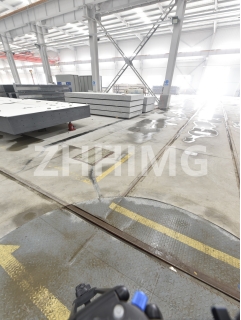Precision granite rails, also known as granite machine bases, are used in a variety of industries for precision measurements and as a stable platform for machinery. These machine bases are made of high-quality granite material that is highly polished to achieve the required standard of flatness, parallelism, and perpendicularity. There are several advantages and disadvantages of precision granite rail, and in this article, we will discuss them in detail.
Advantages of Precision Granite Rails:
1. High Durability: Granite is one of the most durable materials available, and it can stand up to heavy loads, vibrations, and harsh environmental conditions. This makes precision granite rails ideal for use in industries such as aerospace, automotive, and manufacturing.
2. Low Coefficient of Thermal Expansion: Granite has a very low coefficient of thermal expansion, making it an excellent material for use in precision measurement applications. The low thermal expansion coefficient ensures that the machine base remains stable even when there are changes in temperature.
3. High Stiffness and Stability: Granite is a very stiff and stable material, making it an ideal choice for machine bases. The high stiffness ensures that the machine's components remain in their prescribed locations and do not shift or move during operation.
4. Low Maintenance: Precision granite rails require very little maintenance since they are highly resistant to wear and tear. This means that they can be used for extended periods without requiring replacement or frequent repairs.
5. Excellent Accuracy: Precision granite rails have a very high level of accuracy, making them ideal for use in precision measurement applications. The high accuracy of the machine base ensures that the measurements taken are highly precise and consistent.
Disadvantages of Precision Granite Rails:
1. Heavy Weight: Precision granite rails are quite heavy, which can make them difficult to move from one location to another. This can be a problem for industries that require frequent relocation of their machinery.
2. High Cost: Granite is an expensive material, and precision granite rails can be quite costly. This makes them unsuitable for smaller companies that may not have the budget to invest in high-end machinery.
3. Limited Availability: Since precision granite rails are made of granite, which is a natural stone, they can be challenging to source. This means that they may not be readily available in all parts of the world, which can be a problem for some industries.
4. Brittle Material: While granite is a durable material, it is also quite brittle and can crack or break under certain conditions. This means that precision granite rails are not suitable for environments with high impact or shock loads.
Conclusion:
In conclusion, precision granite rails are an excellent choice for industries that require high accuracy and stability in their machinery. The durable and low-maintenance properties of the machine base make it ideal for use in harsh industrial environments. However, the high cost and limited availability of precision granite rails can be a downside for some companies. Overall, the advantages of precision granite rails far outweigh the disadvantages, and they are an excellent investment for companies that require high-precision measurement and equipment stability.
Post time: Jan-31-2024

